I-MRSEC’s Virtual REU to Expose Undergrads to Research, Provide Training in Needed Skills
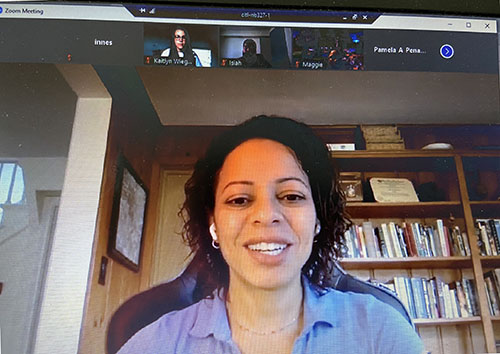
I-MRSEC PI Nadya Mason introduces REU undergrads to the Center during the Zoom REU Orientation.
May 29, 2020
Eleven undergraduate students are participating in the I-MRSEC (Illinois Materials Research Science and Engineering Center) virtual REU this summer from May 27th through July 31st, 2020. However, due to the COVID-19 pandemic, the REU isn't business as usual (in-person interactions with researchers while conducting research in one of Illinois’ state-of-the-art labs). However, the students participating will still carry out research and gain valuable experiences while earning a stipend, just like the in-person program. For example, they'll still have face-to-face interactions with researchers (via Zoom?) while conducting research; they'll still be collecting and analyzing their data and presenting their results. And just like last year’s program, they will still do networking, plus gain other useful information and skills related to research and preparing for a career in STEM…all done virtually!
When offered the chance to either defer until next summer or participate this summer, most undergrads who had signed up for the summer 2020 REU wanted to go ahead and participate virtually. According to Pamela Pena Martin, I-MRSEC’s Outreach Coordinator, a number of their students are going into their senior year, “so this research experience, even if it's not quite the same as in person, it's still really valuable to them.” She reports that those who are planning to enter graduate programs would need to not only have the experience of participating, but be able to add it to their resume, build their network, plus learn skills that they would need in the future. “We realized, if we could manage to do it, it'd be probably very worthwhile to those students,” she reports.
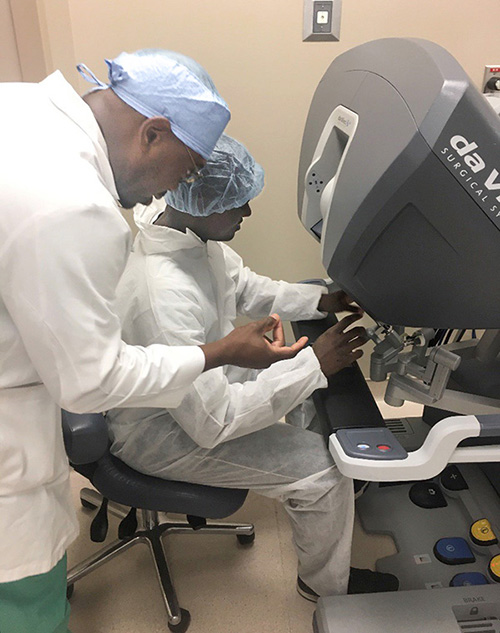
Tarik Simpson learns how to use a scientific instrument while doing a research project at his home institution. (Image courtesy of Tarik Simpson.)
There are eleven students in the program. Seven are being funded directly through I-MRSEC; plus, the REU is also partnering with other groups/professors on campus. In these cases, the others are providing funding for their undergrads, but found them through I-MRSEC’s applicant pool and will also take advantage of I-MRSEC’s programming. For example, Materials Science and Engineering Professor John Abelson, who's not involved with the Center but does NSF-funded materials research, received an REU supplement to fund a student. Also, two students are being funded through another NSF center, the Nanomanufacturing Node (NanoMFG) at NCSA, directed by I-MRSEC professor Elif Ertekin. The eleventh undergrad is funded through a research grant of Ertekin’s.
The REU undergrads are carrying out research related to that done by their different mentors. However, although in last year's REU, students used analysis equipment housed in the Materials Research Lab (MRL, home of I-MRSEC), because this year's students aren't working on-site in campus labs, they won't have access to that equipment. So how will they be able to conduct research? Most are doing computational projects. Although some I-MRSEC faculty do computational research normally (in other words, all of their research is computer based), Pena Martin claims, “It still is a challenge to mentor somebody remotely on those types of projects; it's still different when you're mentoring someone remotely.” Plus, in addition to computational projects, many faculty who do experimental projects also have side projects that must be done on the computer, like data analysis, data mining, doing literature searches to get a better idea of the status of different materials, getting different materials’ parameters and gathering that information. These are the types of projects this year's students will be doing.
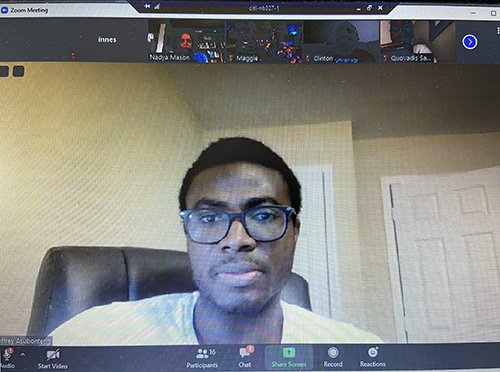
Jeffrey Ausubonteng, funded through NanoMFG, introduces himself to the other REU participants during the May 27th REU Orientation on Zoom.
As part of their summer research experience, students will learn what research is like. They will be expected to answer research questions, learn new research tools, obtain and analyze data, then interpret and share their results. Plus, this summer, in lieu of giving a live talk before an audience of peers, mentors, and other interested persons, students will give virtual presentations both midway through the program and a final presentation at the end of the summer; they will also write a final paper.
In addition to the research itself, the REU will provide quite a bit of training and other professional development. For example, because so many of the projects are computational, the REU is partnering with NCSA to provide a Python workshop to give students the opportunity to learn that computer language. Not only will undergrads participate in the workshop; it is being opened up to current graduate students, as a lot of them are working remotely and may be doing more computational projects as well, but might not have training in this area.
Plus, every other week, the REU will hold meetings related to I-MRSEC’s two main research areas. Students will attend one of two IRG meetings—whichever the research they are conducting most closely aligns with. For instance, some meetings will be related to IRG1: Metallic Antiferromagnetic Materials: Utrafast Charge, Lattice, and Magnetization Dynamics, or the Center’s IRG2 area: Active interfaces between highly deformable nanomaterials.
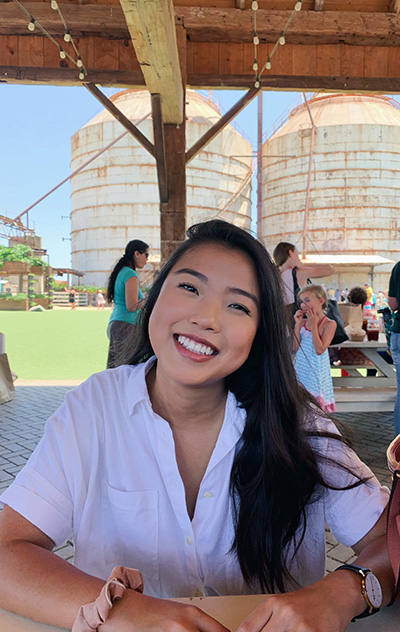
Angela Pak, a rising senior majoring in biomedical engineering. (Image courtesy of Angela Pak.)
Another training opportunity the REU is providing undergrads is a Professional Development Series whose seminars will highlight critical skills needed by a scientist or engineer. Some PD sessions will focus on research and communication skills, addressing data management, research ethics, scientific writing, and how to give effective scientific and/or poster presentations. Other sessions will tackle professional and job skills, including sexual harassment, how to apply for a job or to grad school, how to write an effective resume or CV, and combatting the imposter syndrome.
Pena Martin indicates that they also hope to foster extra networking and mentoring. Characterizing REU participants as “emerging scientists,” she claims that because they’ve been trained in science and sought out a research experience, “It's very possible that some of them will want to stay in research, and they will be our colleagues. And so I think it's important to give them a chance to network with each other and also others on campus. So we'll be doing a little bit of extra effort to have some additional mentoring from other faculty as well, just to create some opportunities to meet and get to learn about other scientists’ paths and get some advice from them.”
To provide this additional component, the REU scheduled a faculty seminar series for the students. I-MRSEC faculty and other Illinois professors, including Daniel Schoemaker, SungWoo Nam, Axel Hoffmann, Cathy Murphy, John Abelson, Elif Ertekin, Andre Schleife, Fahad Mahmood, and Nenad Miljkovic, will share about their research and how they ended up choosing their fields.
Pena Martin acknowledges that one of the challenges they faced in doing a virtual program was addressing the social/relationship-building aspect. Normally, REU students would be living with or near each other, going out for lunch together, even sharing offices. “So this time,” she admits, “we have to be a little bit more intentional creating spaces for them to get to know each other, because we think that's a really important part of the program.”
For instance, prior to the REU, Pena Martin held a get-acquainted Zoom meeting with the students, reporting, “It was really cool to see their faces and get to chat with them.” She says they used an icebreaker, talking about their favorite foods, “trying to create some opportunities for us to get to know each other virtually, which is a little different than being in person.”
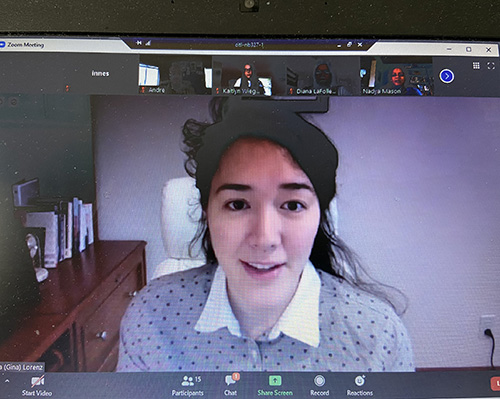
Virginia Lorenzo introduces the REU undergrads to research during the May 27th REU Orientation.
Also off this year’s agenda is everybody’s favorite—the ice cream social—done the second week of the program last summer. “So this year, of course, we can't do that,” Pena Martin laments. Instead, they are planning a virtual web social in June, which will include some fun icebreaker activities.
One final component of the program will be an educational outreach activity. Last year's activity was a table about science at the Urbana Farmer's Market. Since that won't be possible this year, the team is still brainstorming about what might be possible virtually.
On May 27, the first day of the program, program coordinators held an Orientation session via Zoom. During the session, participants met some key players. I-MRSEC PI Nadya Mason shared an overview of I-MRSEC, introduced I-MRSEC faculty, and explained about the center's IRGs (research areas) and educational programs. Professor Virginia Lorenzo, I-MRSEC's Associate Director of Education, introduced the undergrads to what research is; finally, Pamela Pena Martin, I-MRSEC's Outreach Coordinator, shared about the specifics and expectations of the program. During the session, the undergrads also introduced themselves.
Since mentorship is a key component of the program, there was segment about mentoring. First, undergrads shared about previous experiences with mentors, then Pena Martin closed the session by explaining that, as their experiences illustrated, there are different mentoring styles. She urged them to indicate what would be more helpful should their mentor's particular style not be meeting their needs.
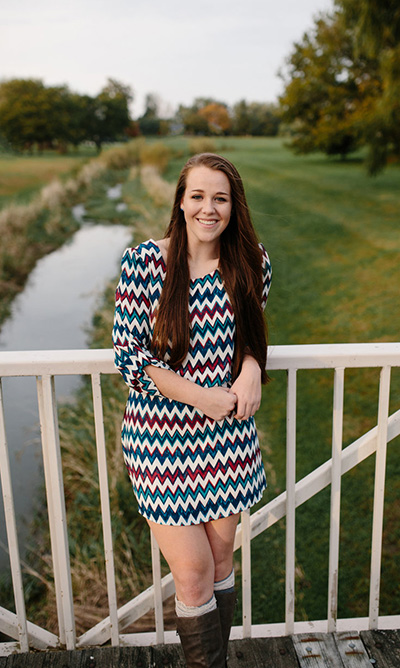
Kaitlyn Wiegand. (Image courtesy of Kaitlyn Wiegand.
Following are introductions to a number of this year’s undergrads, the researchers they are working with, and what they hope to accomplish through the REU. For instance, Angela Pak, a rising senior majoring in biomedical engineering at the University of Texas at Austin, is assigned to Dr. Rashid Bashir's group, and will be working on biomarker detection on transistor-based biosensors.
Pak indicates that before this REU, she had only done maybe 10–15 hours of research a week, in addition to schoolwork. “I applied to this REU to understand what it was like to do research full-time,” she says. “I wanted to try and prepare myself a little better for the graduate school experience.”
Pak reports that after graduation, she hopes to go to graduate school to pursue a PhD in BME. “My dream job would be anything that allows me to continue doing research/development in engineering with a humanitarian focus!” declares Pak.
Also funded through I-MRSEC is Kaitlyn Wiegand, a rising senior in Chemistry at Southern Illinois University (Carbondale), indicates that she signed up for this REU in order to explore her interest in materials research as a possible course of study/research in graduate school. “I hope to gain experience in the process of conducting research, including working collaboratively with others, collecting and analyzing data, and presenting scientific findings,” she explains.
Funded by I-MRSEC, she’ll be in Professor Nadya Mason’s research group, mentored by Mason and Narendra Jaggi while doing micro magnetics simulations.
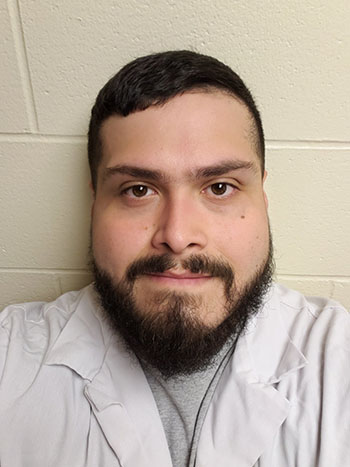
Isiah Ramos. (Image courtesy of Isiah Ramos.)
Her goal after graduation is to attend graduate school in chemistry or chemical engineering. Regarding her dream job, she says she doesn’t have one, “but rather a dream to help others with whatever my job ends up being,” she says.
Another REU participant was Isiah Ramos, a rising junior from Parkland Community College, who’s transferring to Illinois in fall 2020 in Agricultural and Biological Engineering (ABE) with a focus on nanotechnology. Ramos will be working with I-MRSEC Prof. Narayana Aluru, whose research in IRG2 involves active interfaces between highly deformable nanomaterials.
Ramos shares why he applied to I-MRSEC’s REU: “I'm considering pursuing my PhD at U of I, so I wanted to start scouting for prospective mentors as well as learn what kind of research is being done in my area of interest."" Ramos hopes to run his own lab someday.
Tarik Simpson, a rising senior in biomedical engineering at Alabama State University, is working with Professor Sungwoo Nam this summer on image analysis and processing wrinkle structures. Funded through I-MRSEC, Simpson will be working closely with graduate student mentor Jin Myung Kim.
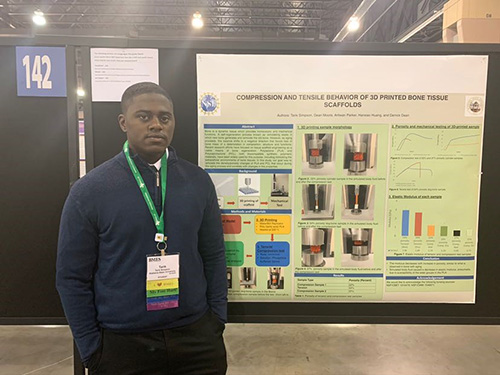
Tarik Simpson presents a poster about his research during the BMES (Biomedical Engineering Society annual meeting in Philadelphia in 2019. (Image courtesy of Tarik Simpson.)
While he calls the research he conducted at his school last summer ‘very nice,” Simpson says he applied for I-MRSEC’s REU in order to be challenged a bit more. “This summer, I wanted to be pushed outside of my comfort zone, and I was advised to apply here because I was told that the University of Illinois Champaign-Urbana had one of the best materials programs,” he explains. His goal was to understand the research process better and broaden his horizons, gaining knowledge that would help him during this upcoming year.
After graduation, Simpson plans to work until he gets accepted into a graduate program. His dream job? Doing biomedical research for the FBI, DOF, or at Yale, Princeton, or MIT.
Also funded through I-MRSEC is Austin Redington, a rising senior studying Chemical Engineering at the University of Minnesota. He'll be working with Professor Daniel Shoemaker doing data mining and computational work regarding known and unknown Antiferromagnetic materials (AFM).
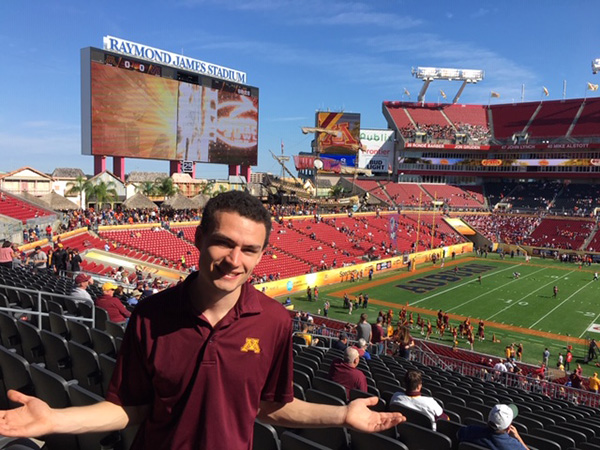
University of Minnesota Chemical Engineering senior Austin Redington at the Outback Bowl. (Image courtesy of Austin Redington.)
Redington says he signed up for the REU in order to experience university research in order to prepare for graduate school. He adds that he's worked in a lab as an undergraduate, but that experience was limited to around 10 hours a week.
Redington long-term goals are to is to attend graduate school. His dream job? To become a college professor and teach either chemistry or chemical engineering.
Another participant is QuoVadis Renae’ Savoy, a rising senior at Southern University A&M at Baton Rouge, Louisiana. An Electrical Engineering major minoring in mathematics, Savoy is being funded through NanoMFG and mentored by Elif Ertekin on a research project called Gr-ResQ (“Graphene Rescue”).
“The research will be related to training neural networks to analyze people’s facemask-wearing habits from public images and analysis of testing methods,” she explains, “— all related to the recent COVID pandemic.”
Savoy shares why she signed up for the I-MRSEC REU: “Because I wanted to gain knowledge on research topics dealing with engineering analysis and to renew my passion for STEM field. I hope to improve in variety of skills while using new equipment, written and oral communication.”
After graduation, Savoy hopes for a career that will allow her to "promote innovation in the design, research, and implementation of products and services. To utilize my knowledge and skills attained to convey that I am a complex problem solver.”
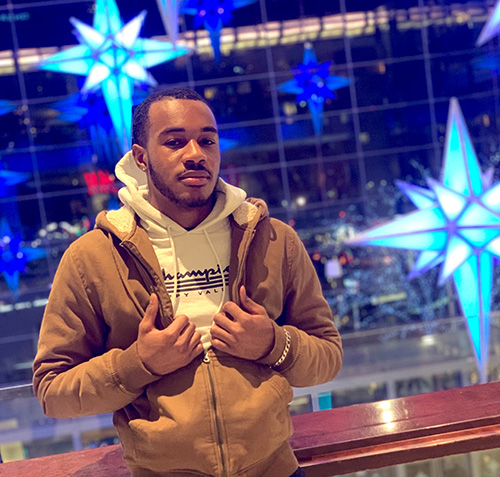
Andre Green, a rising sophomore in Electrical Engineering at Penn State. (Image courtesy of Andre Green.)
Andre Green is a rising sophomore in Electrical Engineering at Pennsylvania State University. Funded by Dr. Elif Ertekin, he will be working in an IRG-2 research area under Ertekin and graduate researcher Emil Annevelink. His task will be to develop a Python script capable of autonomously determining whether the Nudged Elastic Band (NEB) method being observed is completed correctly. “I will first research those determinants to find the finish condition and then implement this condition into a Python function,” he says.
One of the main reasons Green wanted to join the I-MRSEC REU was to gain the necessary research experience for his future. He believes receiving a solid foundation after his first year in college is crucial towards his development and STEM interests.
“When looking at this program, I knew I would gain exactly that through the research that was being conducted and the highly qualified mentors who would guide me along the way,” reports Green. “I hope to gain a better understanding regarding what type of research I want to pursue in the future and become more comfortable conducting research independently.”
After he receives his BS in Electrical Engineering degree, Green plans to attend grad school to work towards either an MS or PhD in Electrical Engineering. His dream job? “To utilize the skills in my field to obtain occupation in which I can work towards the next big technological breakthrough,” he admits.
.jpg)
Diana LaFollette. (Image courtesy of Diana LaFollette.)
Diana LaFollette is a rising senior at the University of Southern California, where she’s majoring in chemical engineering with a focus on sustainable energy and a minor in environmental studies. After graduation, she plans to go on to graduate school to obtain a PhD, possibly in materials science engineering. Acknowledging, “I love both teaching and research!” she claims her dream job is to be a professor.
LaFollette indicates that she applied to the I-MRSEC REU in order to “gain research experience, learn more about materials science, and to spend a summer working full-time in a lab to help narrow down my specific interests before applying to graduate school.” She will be working with Dr. John Abelson this summer, probably in the area of model simulations of thin film nucleation.
Story by Elizabeth Innes, Communications Specialist, I-STEM Education Insitiative. Photos by Elizabeth Innes, unless otherwise noted.
For additional articles about the I-MRSEC REU, please see:
- I-MRSEC REU Exposes Undergrads to Materials Science, Research, and What Grad School Is Like
- I-MRSEC REU Teaches Carmen Paquette a Lot About Magnetism, Research, and Herself
More: Externally Funded, I-MRSEC, MatSE, Physics, I-MRSEC REU, Science Centers, 2020













.jpg)
















